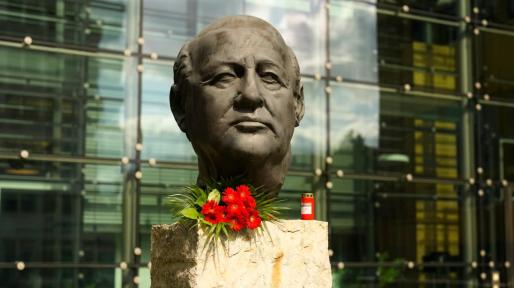
Gorbachev: Honors and criticism
Gorbachev’s sin was not reforming socialism, but rather arriving late when the damage had already been done, something for which, obviously, he cannot be blamed. Neither should he be penalized for what was not done before, or for what was not corrected later.
No politician, monarch or pope is that ‘thing’ everyone likes — revolutionaries and reformers even less. Mikhail Gorbachev was one of them.
This occurs because leaders like Lenin, Mao Zedong and Fidel Castro, among others, at decisive moments in history mediated between colossal social and political forces and carried out works that, as individuals, transcended them: “We have made a revolution greater than ourselves,” declared Fidel Castro.
Gorbachev unleashed forces that he could not lead.
He was not the first and he bore the misfortune of being the last. No one previously had attempted a reform of the structures of the socialist system on the scale that he did. It is not known how far Lenin, who promoted the New Economic Policy (NEP), would have gone defining it as a “strategic retreat,” and Trotsky, who appealed to Lenin to “democratize the process,” did not have the chance because Stalin pushed him into exile and persecuted him relentlessly, ultimately ordering his assassination in Mexico.
Nikita Khrushchev had the courage to denounce Stalin’s political errors and crimes before the XX Congress of the Communist Party of the Soviet Union, but far from trying to structurally reform the system he agreed to the childish maneuver of covering the stains with the euphemism of the “cult of personality”.
By limiting itself to cosmetic changes, the de-Stalinization led by Khrushchev ratifies the statement that sometimes “the cure is worse than the disease,” because it gave rise to the illusion that accounts had been settled.
The journalistic coverage of the time and the memoirs of Soviet protagonists of various orientations testify that Gorbachev, while being audacious, was scrupulously respectful of the structures and institutions of Soviet power, especially the Party. None of the fundamental decisions were made by one person, but were agreed upon (in the style of real socialism) in the existing institutions.
It happened this way because Gorbachev was a creature of the system that he wanted to reform and in fact did, although he could not prevent things from getting out of control.
At the most critical moment of the reform process, when the most orthodox elements of the Soviet leadership hatched a scandalous coup, the pillars of the system — first the Party with 25 million members and three million organizations, the trade unions with 100 million members, the Supreme Soviet and more than 3,000 marshals and generals — looked the other way and with unheard-of frivolity abandoned not Gorbachev, but the Soviet Union they had sworn to defend.
Gorbachev survived his defenestration for 31 years and did so with dignity. He avoided petty politics — not even the cataclysm in Ukraine altered his line, although perhaps it did not because he no longer had the power to get involved in an event of that nature.
Gorbachev was buried on September 3. He did not have a state funeral as befits his place. The current president did not attend the funeral alluding to previous commitments. He did visit the hospital where Gorbachev died with a bouquet of red roses.
Thus did Vladimir Putin fulfill his obligations with the first president of the Soviet Union. He did not do less because he could not, and because Gorbachev embodied values that he does not support. And so it goes.


